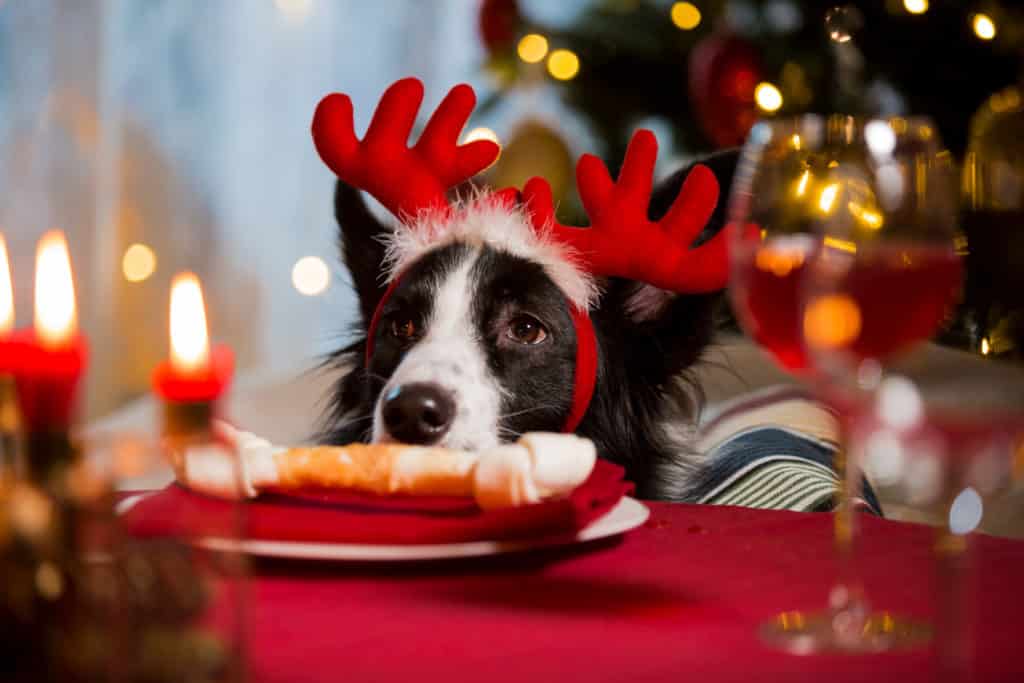Dog Health, Dog Lifestyle
Is it safe to give my dog Christmas dinner? Keeping your dog safe over the festive season
If there is ever a time to get your dog involved at mealtime, it’s Christmas, and a doggy-roast dinner can be the perfect way to treat your canine companion.
But did you know that some human foods can be toxic to dogs, and others should be eaten with caution?
So before writing out your Christmas shopping list, use this guide to find out what foods are safe (and what foods are not) for your doggy to eat this Christmas.
`
The Danger Zone
The following foods can be seriously harmful to your dog. Contact your vet immediately in case of consumption.
Chocolate
We all know our four-legged friends crave a sweet treat as much as the rest of us. But did you know chocolate could poison them?
Theobromine is a highly toxic substance found in chocolate. If consumed, it can make your dog seriously ill or even fatal.
The chemical reacts similarly to caffeine, but dogs cannot metabolise it in the same way humans do.
Onions, Garlic, Leeks, & Chives
These flavoursome herbs are commonly used to add delicious flavours to your Christmas roast. Whether it’s for flavouring your meat and veg, gravy, or used in that extra special stuffing.
But they are also highly toxic to dogs. When consumed, they can damage your dog’s red blood cells, reducing oxygen being taken to the organs (anaemia). In worst-case scenarios, this can lead to kidney damage, collapse, or even death.
Dried and powdered forms of these herbs have higher concentrations of this toxic substance, so be sure to check the ingredients of any human foods given to your dog.
Raisins, Currants, Sultanas and Grapes
Found in Christmas puddings, mince pies and fruitcakes (or even on a cheese board), these traditional sweet treats can cause kidney failure in dogs.
Early signs of poisoning include vomiting, followed by lethargy, lack of appetite, and possibly diarrhoea.
More severe signs include nausea, lack of appetite, vomiting, uremic breath, diarrhoea, abdominal pain, excessive thirst, and excessive urination.
Macadamia Nuts
Tis the season to crack those nuts open – just not in the company of your canine companion!
More often than not, Macadamia nuts will make their debut over the Christmas period. The sweeter nut will most commonly be found in packets of mixed nuts, but it is also an ingredient in biscotti.
When consumed by dogs, the nut can cause vomiting, lethargy, fever, and muscle tremors. A tell-tale sign of macadamia toxicity is tremors in the hind legs.
The Cautious Zone
The following foods should only be consumed in small quantities (if at all). For dogs with existing health conditions, always seek advice from your dog’s vet.
•Pigs in Blankets: These Christmas culinary delights are high in fat and salt, but they don’t have to be excluded entirely. Use lean bacon to reduce the fat content as a Christmas treat, and don’t give your dog too many.
•Gravy: Most gravies will have a high fat and salt content, but this doesn’t mean your dog has to miss out. If you want to make some doggy gravy this year, simply avoid using additives like salt, onion, and garlic.
•Human desserts: Most human desserts will contain high levels of fat and sugar, so it is best to avoid them. But desserts labelled as ‘low in sugar’ can be dangerous. Many of these products use Xylitol, an artificial sweetener that can cause liver failure in dogs in high doses.
•Meat and veg cooked in fat: Feeding your dog a small amount of meat or veg cooked in fat is unlikely to cause long-lasting damage. But be aware that fat can be difficult for some dogs to digest, and can result
The Safe Zone – Christmas food that can be enjoyed by all the family
The following foods can be eaten by your dog. Just keep in mind portion size: the last thing you want on Christmas day is an overfed pooch with a poorly tummy.
•Carrot and Swede mash (no butter, salt, or onion added)
•Boiled or raw carrots
•Parsnips
•Broccoli florets
•Brussel Sprouts
•Green bean
•Peas
•Spinach
•Cauliflower florets
•Lean cuts of white turkey, skin removed
Note: These foods should not be cooked in fat, salt, or sauce.


